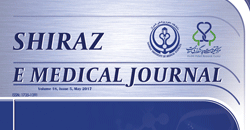Abstract
Context:
The mitral valve conducts blood flow from the left atrium to the left ventricle. Mitral regurgitation occurs when the valve couldn’t be closed properly at the end of ventricular filling. Mitraclip, a catheter-based device that can reduce mitral regurgitation without requiring open surgery, is routinely used for patients with unacceptable risk of conventional mitral valve repair or replacement.
The purpose of this study is assessing the safety, efficacy, andeconomicaspects of Mitraclip treatment for mitral regurgitation.
EvidenceAcquisition:
The Cochrane Library, the TRIP database, and Google Scholar have been searched through appropriate strategies. Seven studies were included in the final phase based on the inclusion and exclusion criteria. Data collected from these studies were analyzed based on four main themes; applications, safety, efficacy, and economic evaluation.
Results:
The most potential side effects were related to an improper transfer of catheters and low durability of the device. One of the included studies showed that improved outcomes of the New York Heart Association (NYHA) was more in the clip group with better quality of life that were observed after 1 to 12 months in 192 patients and also one-year mortality rate after using clip ranged between 10% and 24%. This included study found that 72% to 100% of patients with Mitraclip have been successfully treated and the duration of hospital stays in these patients was between 5 to 10 days. The cost-effectiveness of the procedure still needs more robust evidence.
Conclusions:
Given the lack of high quality evidence and relatively high cost of Mitraclip, it seems that until further robust evidence is produced; it should be used in research and in high risk patients selected after detailed examination with strict indications and appropriate opinions of cardiologists.



No responses yet